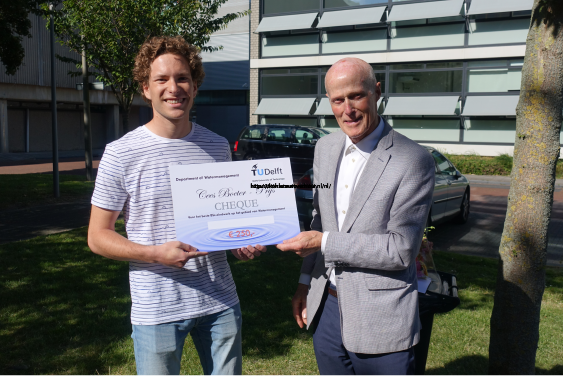Pierrick Spekreijse (2018/2019)
Cees Boeter Award 2019
Cees Boeterprijs - Award presentation
"Each year, the Department of Water Management presents the award Cees Boeter Award for the best Bachelor thesis written in this academic year of 2018-2019.
The goal of this award is to stimulate students to perform excellent, novel and societal relevant research.
As each year, the jury has been able to select three nominees from a highly competitive group of about 60 bachelor thesis students with a large variety of topics water management and environment engineering topics.
I am proud to announce the three nominees of this year - in random order.
Nominee 1 Dorette Regout - Dorette studied the feasibility of implementing desalination for the production of fresh water in Mauritania. She investigated the future water demand, designed a distribution network and calculated the cost of fresh water from such a system. The results are clearly relevant for water resources management and drinking water security in Mauritania.
Nominee 2 Pierrick Spekreijse - Pierrick studied the functioning of an urban water buffer in Rotterdam with different filter types for its ability to remove arsenic, cadmium, copper and other substances. Based on lab tests that he performed himself he could draw conclusions on which biofilters are more effective given different pH ranges of the urban runoff water. The results are relevant for future optimization and design of water buffer systems.
Nominee 3 Charlotte van Strien (unfortunately could not be present) - Charlotte studied whether taking into account a dynamic or constant leaf area index in a hydrological model yields better predictions of discharge. She found that the dynamic interception capacity gave slightly better performance in spring and autumn when the model was applied to a small catchment within the Meuse basin. The results are especially relevant for creating hydrological models that need to predict under change.
The three nominees show that our best BSc students are able to tackle important problems, have the skills to deal with complicated data sets, are able to analyse complex outcomes and draw relevant conclusions.
This year, the winner is the student that managed to perform accurate and precise work in the water laboratory, managed to distill useful information from the large amount of measurement data, wrote a clear and impressive report and reached relevant conclusions and recommendations for future research and design of urban water buffers. Our winner of the 2019 Cees Boeter Award is Pierrick Spekreijse!”
